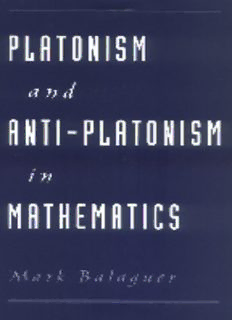Table Of ContentPlatonism and Anti-Platonism
in Mathematics
This page intentionally left blank
Platonism and Anti-PIatonism
in Mathematics
MARK BALAGUER
New York Oxford
OXFORD UNIVERSITY PRESS
1998
Oxford University Press
Oxford New York
Athens Auckland Bangkok Bogota Bombay
Buenos Aires Calcutta Cape Town Dar es Salaam
Delhi Florence Hong Kong Istanbul Karachi
Kuala Lumpur Madras Madrid Melbourne
Mexico City Nairobi Paris Singapore
Taipei Tokyo Toronto Warsaw
and associated companies in
Berlin Ibadan
Copyright © 1998 by Mark Balaguer
Published by Oxford University Press, Inc.
198 Madison Avenue, New York, New York 10016
Oxford is a registered trademark of Oxford University Press
All rights reserved. No part of this publication may be reproduced,
stored in a retrieval system, or transmitted, in any form or by any means,
electronic, mechanical, photocopying, recording, or otherwise,
without the prior permission of Oxford University Press,
Permission granted for material from "The Wizard of Oz",
© 1939 Turner Entertainment Co., a Time Warner Company.
Library of Congress Cataloging-in-Publication Data
Balaguer, Mark.
Platonism and anti-Platonism in mathematics / Mark Balaguer.
p. cm.
Includes bibliographical references and index.
ISBN 0-19-512230-5
1. Mathematics —Philosophy. 2. Platonists. I. Title.
QA8.4.B345 1998
510'1 — dc21 97-33108
9 8 7 6 5 4 3 21
Printed in the United States of America
on acid-free paper
This book is dedicated to two women who have given
me undying love and support—my mother, Marcella Balaguer,
and my wife, Reina Roberts.
This page intentionally left blank
Acknowledgments
Several people have read portions of this book and offered helpful comments,
and I would like to express my appreciation to all of them. They include Jody
Azzouni, Melchor Balaguer, Daniel Bonevac, Stuart Cornwell, Seth Crook, Rus-
sell Dale, Anthony Everett, Hartry Field, Ricardo Gomez, Bob Hanna, Jerry Katz,
Arnold Koslow, Charles Landesman, Maureen Linker, Michael Liston, David
MacCallum, Penelope Maddy, Colin McLarty, Henry Mendell, Elliott Mendel-
son, Yiannis Moschovakis, Tom Oberdan, David Pitt, Michael Resnik, Stephen
Schiffer, Barbara Scholz, Stewart Shapiro, Tom Slaughter, Adam Vinueza, and
Edward Zalta. Chapter 3 was read at the University of Colorado, Boulder, where
I received some very helpful comments from several people in the audience, es-
pecially George Bealer. Chapter 4 was read at a meeting of the Association of
Symbolic Logic at the University of Wisconsin, Madison, and I received useful
feedback there from a number of people, including Geoffrey Hellman and Charles
Parsons. Chapters 3 and 4 were read at UCLA, where I received helpful comments
from Joseph Almog, Paul Hovda, Tony Martin, and Yiannis Moschovakis, among
others. Chapters 6 and 7 were read at the University of California, Irvine, where
I received useful comments from Pen Maddy, Jeff Barrett, and Peter Woodruff.
Chapter 8 was read at Cal State, Los Angeles, where I received helpful comments
from several people, including Jenny Faust, Danny Herwitz, Kayley Vernalis, and
Henry Mendell.
Among these people, four deserve to be singled out. From Jerry Katz and
Mike Resnik, I have learned a lot about how to be a platonist; and the position
developed in Part I of this book is influenced by the works of these two philoso-
phers. From Hartry Field, I have learned a lot about how to be an anti-platonist;
and the position developed in Part II owes quite a bit to his work. And from my
father, Melchor Balaguer, I have learned a lot about how to be a thinker; and the
position developed in Part III owes something, I think, to a desire to synthesize
that I acquired from him.
viii Acknowledgments
Much of the research for this book was funded by a dissertation fellowship
from the City University of New York, two fellowships from the National Endow-
ment for the Humanities —one a summer fellowship and the other a yearlong
fellowship —and a Creative Leave grant from California State University, Los An-
geles. I would like to express my gratitude to all three of these institutions. Finally,
I would like to thank all of my colleagues in the philosophy department at Cal
State, Los Angeles, for providing such a wonderful environment in which to write
philosophy.
Los Angeles, California
September 1997 M.B.
Contents
1 Introduction 3
1. The Project of This Book 3
2. Mathematical Platonism and Anti-Platonism 5
3. Synopsis of the Book 14
ONE Platonism 19
2 The Epistemological Argument Against Platonism 21
1. Introduction 21
2. Formulating the Epistemological Argument 22
3. A Taxonomy of Platonist Responses 24
4. Contact with Other Worlds: Godel 25
5. Contact in This World: Maddy 28
6. Knowledge Without Contact 35
3 A New Platonist Epistemology 48
1. Introduction 48
2. Skeleton of the Refutation of the Epistemological Argument 48
3. Internalist vs. Externalist Explanations 53
4. Defending and Motivating FBP 58
5. Consistency 69
4 Non-Uniqueness Embraced 76
1. Introduction 76
2. Trying to Salvage the Numbers 77
3. Structuralism 80
4. The Solution 84
5. Two Loose Ends 90
Description:In this highly absorbing work, Balaguer demonstrates that no good arguments exist either for or against mathematical platonism-for example, the view that abstract mathematical objects do exist and that mathematical theories are descriptions of such objects. Balaguer does this by establishing that bo

